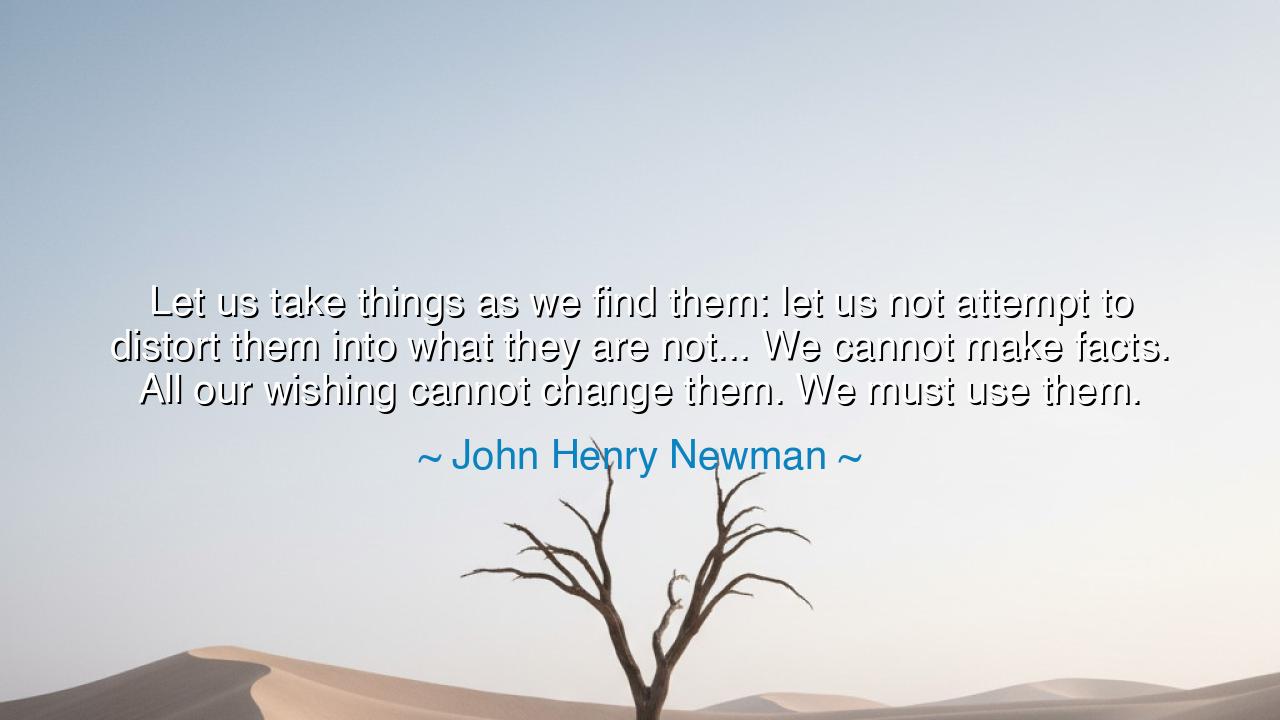
Let us take things as we find them: let us not attempt to distort
Let us take things as we find them: let us not attempt to distort them into what they are not... We cannot make facts. All our wishing cannot change them. We must use them.






Host: The train rattled through the rain, its rhythm a slow, metallic heartbeat echoing down the tracks. The windows were fogged, and the world beyond them blurred into motion—gray fields, tilted barns, and the flicker of distant lights fading into the mist.
Inside the carriage, Jack sat by the window, a newspaper folded on his lap, jaw tight, eyes staring** through the glass like someone trying to see what’s hidden behind the visible. Across from him, Jeeny cradled a book, her voice gentle as she read aloud:
“Let us take things as we find them: let us not attempt to distort them into what they are not... We cannot make facts. All our wishing cannot change them. We must use them.” — John Henry Newman.
Jeeny: “It sounds so simple, doesn’t it? Just… accept what is. But I think it’s one of the hardest things a person can do.”
Jack: (still looking out the window) “Because we don’t want the truth, Jeeny. We want a version of it that doesn’t hurt.”
Host: The light from a passing station flashed across his face, illuminating the fatigue in his eyes—the kind of tiredness that isn’t from work, but from living too close to reality.
Jeeny: “But that’s what Newman was warning about. Our wishing, our denial—it doesn’t change the world, it just blinds us to it. Maybe that’s why so many people stay miserable. They’re fighting the facts instead of using them.”
Jack: “You sound like a scientist now.”
Jeeny: (smiling faintly) “And you sound like a man who’s tired of facts.”
Jack: “Facts are cold, Jeeny. They don’t bend, they don’t comfort, they don’t forgive. People keep saying truth sets you free, but more often it just breaks you first.”
Jeeny: “Maybe that’s the kind of freedom that matters. The kind that hurts before it heals.”
Host: The train lurched, and the lights flickered. For a moment, they were both in darkness, and the only sound was the rain and the rattle of iron.
Jack: “You know what I hate most about facts? They don’t care. You lose someone, you fail, you regret—and the world just goes on. No pause, no mercy. It just… keeps being true.”
Jeeny: “That’s not cruelty, Jack. That’s continuity. Facts are what’s left after the illusion burns away. They’re not meant to care—they’re meant to anchor.”
Jack: “Anchor? Or shackle?”
Jeeny: “Both, maybe. Until you learn how to use them.”
Host: The silence between them was thick, filled with the hum of the rails beneath and the memory of a hundred things neither could say.
Jeeny: “You remember when your father got sick? You kept saying the doctors were wrong. You didn’t want to believe the facts then, either.”
Jack: (quietly) “Because they were too final.”
Jeeny: “But facing them is what gave you the strength to be there, wasn’t it? To do what needed to be done. That’s what Newman meant. We can’t make facts, but we can work with them. That’s how we turn loss into meaning.”
Jack: (bitterly) “You talk about meaning like it’s currency. As if it can buy back what’s gone.”
Jeeny: “Not buy it back. But maybe justify the cost.”
Host: The rain outside began to ease, and the gray light of dawn began to rise, sliding slowly across the seats, touching their faces. The train moved through a valley, where the fog hovered like breath held between heaven and earth.
Jack: “You really think we should just accept everything? Even the ugly parts?”
Jeeny: “Especially the ugly parts. The beautiful things don’t need understanding, Jack. Only the broken ones do. That’s where truth actually lives.”
Jack: “Truth lives in the broken?”
Jeeny: “Yes. Because only what’s broken ever gets examined. We never question what still works.”
Host: She leaned forward, eyes catching the faint light. The way she said it was soft, but her words landed with gravity—the kind that could only come from a soul that had already lost, already accepted.
Jack: “And what happens when the facts destroy your faith?”
Jeeny: “Then maybe your faith was in the wrong thing.”
Jack: “You sound like you’ve made peace with all of this.”
Jeeny: “No. I just stopped trying to change the weather and started learning how to walk in the rain.”
Host: The train began to slow, the brakes screeching against the tracks like the cry of something metallic and alive. A station came into view, its sign blurred by mist.
Jack: “So that’s it? Just take the world as it is?”
Jeeny: “Take it as it is—but not as it has to stay. Facts don’t decide the future, Jack. They just tell you where you’re starting from.”
Jack: (pausing, almost whispering) “Maybe that’s what I’ve been afraid of—starting again.”
Jeeny: “Then that’s your first fact. Now, use it.”
Host: The doors opened, and the sound of rain and voices rushed in. Jack stood, hesitated, then stepped out onto the platform, coat collar pulled high against the morning chill.
Jeeny followed, her footsteps light, her eyes bright with that quiet, unspoken kind of faith—not in miracles, but in facts used wisely.
The camera would have panned upward—
to the gray sky, the steel rails, and the river of people moving through mist—
each one carrying their own truth, their own facts, their own beginnings.
And in that soft, morning light, one truth lingered, steady and simple as the tracks stretching ahead—
that acceptance is not surrender.
It is the first act of strength,
and the only path by which truth becomes useful.






AAdministratorAdministrator
Welcome, honored guests. Please leave a comment, we will respond soon